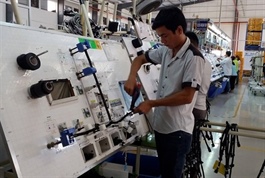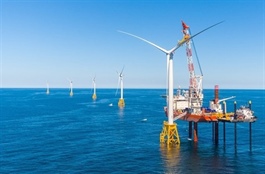Việt Nam’s manufacturing growth hinges on AI for boosting productivity
Việt Nam’s manufacturing growth hinges on AI for boosting productivity
While digital transformation is a priority for manufacturers, around 30 to 40 per cent of global and Asia Pacific (APAC) respondents recognise achieving it is fraught with obstacles.

Vietnamese businesses must embrace the need for reskilling and retraining their workforce to stay competitive. — Photo courtesy of the firm |
Those barriers include the cost and availability of labour, scaling technology solutions and the convergence of information technology and operational technology (IT/OT).
The information was released at the findings of 2024 Manufacturing Vision Study from Zebra Technologies Corporation, a leading digital solution provider enabling businesses to intelligently connect data, assets and people.
The study showed that globally, 61 per cent of manufacturers expect AI to drive growth by 2029, up from 41 per cent in 2024.
In APAC, 68 per cent of manufacturers expect AI to drive growth by 2029, increasing from 46 per cent in 2024. This surge in AI adoption, combined with 92 per cent global and 87 per cent of APAC survey respondents prioritising digital transformation, underscores manufacturers’ intent to improve data management and leverage new technologies that enhance visibility and quality throughout the manufacturing process.
In Việt Nam, the Government has consistently set ambitious targets for the manufacturing sector, with it expected to contribute 30 per cent to the overall GDP.
The sector’s contribution to GDP is expected to grow by more than 8.5 per cent per annum, while labour productivity is forecast to grow 7.5 per cent per annum. To achieve these goals, Vietnamese businesses must embrace the need for reskilling and retraining their workforce to stay competitive.
Adopting artificial intelligence (AI) and other advanced technologies is crucial for enhancing productivity, improving quality and streamlining operations.
Christanto Suryadarma, Sales Vice President for Southeast Asia (SEA), South Korea and Channel APJeC, Zebra Technologies said foreign investors had increasingly been investing in Việt Nam. In 2023, the manufacturing sector alone attracted US$20 billion in foreign direct investment (FDI), which represents over 60 per cent of the total FDI in the country.
This underscored the significant development potential of Việt Nam’s manufacturing industry. The country has successfully established a stable and sustainable manufacturing base, encompassing sectors such as textiles, footwear, electronics, machinery and food processing. Việt Nam had positioned itself as a major manufacturing hub in Asia, particularly in electronics and textiles, he added.
He suggested that to sustain this growth, Vietnamese businesses needed to focus on retraining and equipping their workforce with new skills to stay competitive. Embracing AI and advanced technologies would be crucial for enhancing productivity, improving quality, and optimising operations.
He also highlighted that digitalising manufacturing processes, implementing smart manufacturing technologies and modernising and automating production were key factors driving economic advantage.
Currently, many manufacturing sectors in Việt Nam were rapidly advancing in digitalisation and adopting cutting-edge technologies to optimise their operations.
While ambitious goals are important, they can be achieved by starting on a smaller scale, making the implementation process more manageable, according to Suryadarma.
According to the survey, overall, the quest for quality has intensified as manufacturers across segments must do more with fewer resources. The manufacturing leaders say today’s most significant quality management issues are real-time visibility keeping up with new standards and regulations, integrating data and maintaining traceability.
Visibility is the first step to transformation – through adopting AI and other new technologies. This enables manufacturers to leverage data more effectively to identify, react and prioritise problems and projects to deliver incremental efficiencies across the manufacturing process, ensuring the greatest impact upfront.
“Manufacturers struggle with using their data effectively so they recognise they must adopt AI and other digital technology solutions to create an agile, efficient manufacturing environment,” said Christanto Suryadarma. “Zebra helps Vietnamese manufacturers work with technology in new ways to automate and augment workflows, to achieve a well-connected plant floor where people and technology collaborate at scale.”
Zebra empowers manufacturers with strategic insights and technologies to advance the connected factory by boosting visibility, optimising quality and augmenting their workforces.
“Technological innovations, such as machine vision and deep learning OCR solutions, are opening doors for manufacturers to excel in an era marked by rapid technological advancement and growing requirements for speed, safety, and precision,” said Tan Aik Jin, APAC Solutions Lead for Manufacturing and Singapore ZEC, Zebra Technologies.
“Beyond just adopting technology, businesses need to be prepared and equipped to continually transcend current capabilities. The future of manufacturing demands a symbiotic relationship between technology and human expertise to redefine the essence of manufacturing.”























